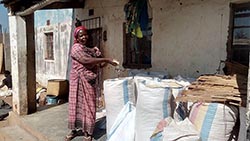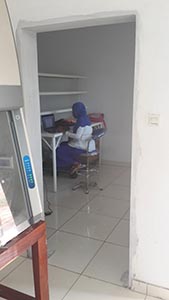Towards the end the N2Africa project focused on scaling out the legume technologies proven under Phase I using a “business-led” approach. This involved engaging government, development organizations, and the private sector, creating awareness on N2Africa technologies and approaches, and facilitating dissemination campaigns. The project focused on soyabean and cowpea agronomy (sowing time, optimal planting density, advantage of improved over traditional varieties, response to fertilizer application, use of inoculants, postharvest handling), the input supply systems, and local capacity building for government extension officers, agrodealers, and individual community seed producers.
More than 25,000 smallholder farmers have been reached by directly hosting on-farm demonstration trials, Train the Trainer training, and field days in Manica, Tete, and Zambézia provinces. Using public–private–partnership approaches N2Africa disseminated four varieties of soyabean and two of cowpea. Market linkages were established between farmer associations and off-takers.
Better seeds is the foundation
Access to new seed varieties is a common and long-standing stumbling block for smallholder farmers in Mozambique. Working with seed companies, smallholder farmers associations and rural agro-dealers, N2Africa Project helped farmers in remote areas in evaluating the performance of soyabean and cowpeas varieties while building long term sustainable supply chains. In remote community of Angónia district, Maria Brigida Miguel Noé, is an emerging entrepreneur who has benefited from the N2Africa, and is making progress in removing the stumbling blocks. Trained by N2Africa on good agricultural practices for soyabean production she is now commercializing seed for other fellow farmers. Initially she received 25 kg of soyabean from N2Africa. In subsequent seasons she bought the seed directly from agro-dealers located at Ulongue, the main village in the district or in neighbouring villages in Malawi. “I decided to set up this business primarily to improve my life by selling seeds but also to help my fellows in the association. Seeing the demand for soyabean seed growing I decided to became the main seed provider in the village, by also growing other crops such as groundnut and maize.”, Maria said, on her business.
| Maria is already starting to see her hard work pay off and she is confident of a better future. “With seed business I was able to build a new house, I successfully requested additional land (30 ha) and cattle. Next season when you will visit me you will be surprised with a vehicle that I am planning to buy. It is too expensive to rent a car locally to transport the produce,” she said. Maria is one example of how N2Africa worked towards the Objective 3 of the project: Empower Women to increase benefits from legume production. (For more details see also the IITA Newsletter story highligting the story of Maria Brigida Miguel Noé). |

|
Support the local institutions to enable sustainability
| While inoculants have proven to have high return on investments, inoculant quality is important as better seed to achieve good yields. To address the issue with inoculant quality control, N2Africa Project purchased and equipped an rhizobiology laboratory that was donated to IIAM, the main government research institution in Mozambique. Two newly recruited IIAM technicians will be trained and supported by Dr. Amaral Chibeba at IITA-Mozambique on basic aspects of inoculant control. Amaral is a former N2Africa PhD awardee. The IIAM technicians will also be trained in Ibadan on rhizobiology with main focus on inoculant quality control and production. This training is planned for the month of December. |  |
The N2Africa Project Mozambique Exit Strategy report is available here.
Wilson Leonardo, Country Coordinator Mozambique
